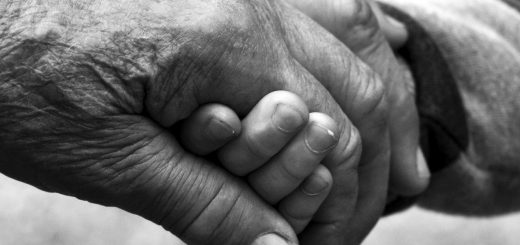Recovery From Mental Illness? – Healing, Self-Management and Improvement of Quality of Life

Let me start with that I don’t believe in that recovery is something to work towards when you struggle with mental illness. Recovery, for me, would mean getting to a place of where you are back in the kind of state that you were in before you ended up struggling with your mental health. In other areas of health that is definitely possible. If you get the flu, if you break a bone, even if you have cancer. But with mental health I think it is just very different. Most mental illness is chronic in one way or another. Instead of things disappearing for good, they might be easier to handle. You maybe have learnt coping strategies to deal with the issues, but there is no guarantee that it won’t get worse again.
Recovery?
If you want to talk about mental illness and recovery, then maybe it can be seen in the same discourse as addiction: you recover from the acute phase of addiction, but you need to forever work on staying clean. You need to always use your tools, remind yourself of self-care. A recovered addict is still an addict, but in control of their addiction. That is somewhat similar to mental illness where the acute phase might be in the past, but there is always a risk of falling off the wagon and go back using old unhealthy coping strategies. Circumstances, vulnerability, overwhelming events can bring the old issues back. I do not believe that you can recover from mental illness.
Now, it might seem a bit harsh when I say I that you can’t recover from mental illness. I don’t mean that you can’t get better, I just think that the right terminology needs to be used. For me, there are two types of mental illness: those that are chronic and need to be managed, and those that you can heal from. I suffer from both kinds, so let’s take a closer look at what I mean!
Chronic Mental Illness
Almost any mental illness can become chronic: depression, anxiety, personality disorders, trauma related illnesses. But there are a few that need medication and constant treatment to be managed, always. You can not heal from those illnesses because they are brain disorders and have a major genetic aspect to them. I am talking about illnesses like bipolar disorder and schizophrenia.
When I say that you can’t heal from them, I mean that you won’t be able to get better if all the treatment you get for them is talk therapy or behaviour therapy. They are progressive, meaning they get worse without treatment and with time. You can’t process them. You need medication for them, just to manage them. If you are off that medication, you will be sick again.
There is a difference in treatment for personality disorders like Borderline Personality Disorder, and something like Bipolar Disorder, for instance. Borderline Personality Disorder can be taught to self-manage and studies have shown that this particular personality disorder can even go away with age, with a drop happening in the 40s. Therapies like DBT even make it possible for the diagnosis to be written off and taken out of your medical file. If you put work into it, then you might be able to not have Borderline Personality Disorder anymore.
Medication and Self-Management
That is not possible with something like Bipolar Disorder, And that is something I have been struggling with for a long time, and still am struggling with: accepting that Bipolar Disorder is chronic and progressive. I will never be able to recover or heal from this disorder. I am going to suffer from it until the day that I die.
But just because I can’t recover from it (it is not something that all of the sudden happened to me after all, I am born with it), doesn’t mean that all hope is lost. Instead of recovering or healing from Bipolar Disorder, I can treat it and manage it. I am currently not on any medication for it because I am less than pleased with the side effects that I had to endure with the medication that I gave a try. Instead, I am self-managing. For me that means not only being able to handle the symptoms, but also being more self-aware so I don’t make things worse. Because Bipolar Disorder is progressive, if I would allow it to roam free, I might just be at danger to develop type 1 instead of type 2, and get psychosis.
Self-management is definitely harder than taking medication but at the moment that is the only choice I have, especially without any professional support in my life. I have gotten better at it with time. I can read the signs of an episode coming up, I avoid the things that make an episode worse or begin. I very much know what helps me in depression, in hypomania and in mixed episodes. It can get exhausting, and I often just want to give up. It is neverending, I can’t get a break from it. But I have seen the damage that Bipolar Disorder can do to my life in the past, so I need to be always in top of it. I can never recover from Bipolar Disorder, but I believe in remission. There are periods where it is better, when the stable periods are months long, when there is no acute bipolar episode. But it will always return. I can’t escape it.
Trauma-Based Illness
The other kind of mental illnesses that I want to bring up are those based on trauma. You can’t recover from trauma that has caused you mental illness. The mental scars will always be there, your soul is never going to be the same like it was before the trauma. But I believe that you can heal from trauma. You will not be the same person you were before the trauma, that person is forever lost. But you can become a new you, one with a mental scar that is not an open bleeding wound anymore.
But how does one get there? To a point where healing can even begin? I think the only way to get there is to process the trauma, and then learn to build yourself up from there, learning tools to handle the worst symptoms and to work towards a new you, a you where the trauma doesn’t define you anymore, but you define who you are.
For Post-Traumatic Disorder that is very much possible. EMDR treatment has been proven to be very effective for those who have been through a single traumatic event. You process the trauma, it doesn’t affect you and your behaviour as much, and you can work on a version of yourself that is not defined by what has happened to you.
With complex trauma that is a bit more difficult. Complex trauma is if you have been through trauma that you had to endure during a long period of time, in a situation that you couldn’t get out of. A lot of times this kind of trauma is linked to extreme situations like human trafficking, being in a cult or emotional, physical and sexual abuse during childhood. The trauma very much defines who you are. All your behaviour is coming from the trauma, your thoughts, your feelings, the way you see yourself, the world and others, all that is linked to the trauma. You are conditioned by it. Illnesses stemming from complex trauma are for instance Complex Post-Traumatic Stress Disorder and Dissociative Identity Disorder.
Healing and Improvement of Quality of Life
Healing from complex trauma is a neverending process. There is not going to be a point where you can walk out of the therapist’s office and you have recovered who you used to be. No. You are forever changed. A lot of times, you don’t even know who you were before the trauma because it happened from the day you were born. Treatment for C-PTSD and DID is said to take decades for many, and it does not cure you. It helps you to walk on the path of healing instead.
I am diagnosed with both C-PTSD and DID. I know that I will never get over my trauma and I know that I will never be able to leave it behind. It will follow me for the rest of my life. It doesn’t have the same kind of chronic nature as Bipolar Disorder, because it can get better. It is not progressive in the same way. Once you are out of the traumatic situation, theoretically you can start healing.
What does healing mean for me though? I think healing is a process for me, a process with no end goal. It is a path I can choose to be on, to walk forward and not backwards. It has to do with processing, with acceptance, with being able to handle the symptoms better. For the different treatments it might have certain goals, but I am not sure I believe in those goals set by therapy. I think everyone needs to have a point they are working towards, something that fits their situation. For me that elusive point to work toward is to improve my quality of life.
I am not actively healing at this point because I don’t have any professional support. I am without therapist, without psychiatrist. There is no way for me to process anything in a safe environment, there is no way for me to even grasp all my trauma. But I am still working on improving my quality of life by handling my symptoms, by trying to be accepting and to not deny my trauma. This is what I can do for myself. I am not very successful with this, to be honest. But I don’t want to be forever stuck, so I am trying to walk into my future, and handle the now. I want to define who I am. I don’t want my abusers to forever have molded me into what they saw me as.
Real Hope vs. False Hope
I don’t think you can recover from mental illness. I think it is the wrong term to use. Instead I suggest using terms like successfully coping, self-management and management, healing and improvement of quality of life. Science is still out if even something like a clinical depression is actually curable, or actually only is managed and coped with. I know it is really hard to accept that what you have, you might have to forever deal with, work on and heal from. But I think being realistic is important to be able to have real hope and to put effort into the right things, instead of trying to chase some dream of magical perfect mental health.











indeed niiot a pill or shot in the arm
it’s more then taking shackles off
be as well as You can be. it is about management
hugs
Thank you,, Sindee <3
I do agree that u can’t necessarily completely recover, but managing your issues may be attainable and I also think that applies to some physical aliments too.
Hope is a good thing for sure x
Yeah, for sure. I think using the right terminology makes it also easier to work towards goals, and leaves disappointment out. You might not be able to recover from mental illness, but that doesn’t mean that it isn’t treatable or can’t be managed well enough to live a life worth living.
Thank you so much for this piece. These were exactly my thoughts when I considered the prompt.
I’m in the same place as you, regarding the cPTSD without help of a psychologist, and from what I’ve read, there’s little they can do anyway. They can help you cope, maybe make things somewhat more bearable, but there’s no cure.
So I’ll continue the way I do now, doing things my (maybe sometimes weird but okayish) way. There’s no real recovery for us, just going along with the tools we have. Thanks for sharing!
I am glad that you can relate to my perspective, not so much that you had to go through trauma to be able to, though. I see it as a constant process. We always have to work on getting better, on healing, on handling the symptoms. Processing the trauma definitely can only be done in therapy, but for some, the processing is not even possible. So, as you said, there is no real recovery but that doesn’t mean that there isn’t a chance to get better!
This is a great reflection. I agree with you, that it’s about trying to manage your MH rather than expecting “recovery” to be a complete absence of the problem or the possibility of lapses. That can be a disappointing thing to acknowledge, that you’ll always be fighting against it, but as you say, it avoids worse disappointment when one has a lapse. 💜🌷
I think people generally want the bad things to go away, so I get they’d want total recovery to be an option. Having to put in work and effort to feel okay for the rest of your life is a damn shitty thing. But remission and an improvement in quality of life are possible, so not all hope is lost!
True. Very true.